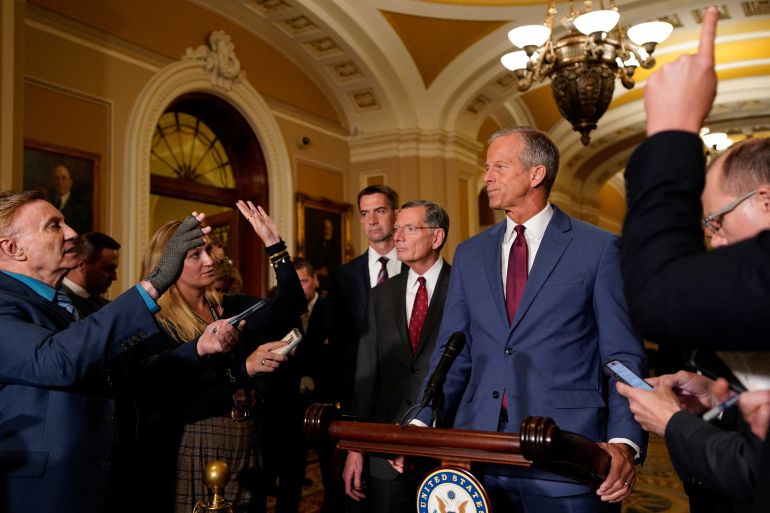US Senate approves 48 Trump nominees in a single vote
Mass approval of nominees follows rules change that make it easier to approve lower-level Trump nominations.

By Erin Hale
and the Associated Press
Published On 19 Sep 202519 Sep 2025
Save
The United States Senate has confirmed 48 of President Donald Trump’s nominees to government positions, following a recent rule change that allows the chamber to approve lower-level appointments in batches rather than individually.
Key political appointments on Thursday included Kimberly Guilfoyle, a former FOX News host and ex-fiancee of Donald Trump Jr, as US Ambassador to Greece.
Recommended Stories
list of 4 itemsend of list
Callista Gingrich, the wife of conservative political pundit Newt Gingrich, was also appointed ambassador to Switzerland and Liechtenstein. She previously served as US Ambassador to the Holy See during Trump’s first administration.
The Republican-controlled Senate also approved dozens of nominations to the departments of defence, energy, labour, and the interior, as well as the US ambassadors to Argentina and Sweden.
The mass vote has been portrayed in the US media as a significant win for the Trump administration, which has struggled to get approval for more than 100 appointees due to ongoing opposition from Democrats.
Senate Majority Leader John Thune said the vote was possible thanks to a change in rules last week to “overcome Democrats’ historic obstruction” of the nomination process.
Under the new rules, the Senate can now approve lower-level nominations with a simple majority, according to The Associated Press news agency.
Previous rules remain in place for higher-level posts, including judicial and cabinet-level nominations.
Advertisement
Approving even non-controversial civilian nominations has become an increasingly contentious process for presidents in recent years, according to Thune, where they were once approved by near-unanimous consent or “voice vote”, which was a simple measure of vocal approval.
“[President Trump is] the first president on record not to have a single civilian nominee confirmed by unanimous consent or voice vote,” Thune told the Senate on Thursday, accusing Democrats of “delay for delay’s sake”.
The fight over Trump’s nominations escalated in August during a Senate recess, when the president told Senate Democratic Leader Chuck Schumer to “GO TO HELL” in a post on Truth Social. Schumer said at the time that Democrats opposed Trump’s nominations to government posts because they were “historically bad”.
The move to block nominations has also been portrayed by the US media as one of the few tools at the Democrats’ disposal due to holding a minority in both legislative houses.

